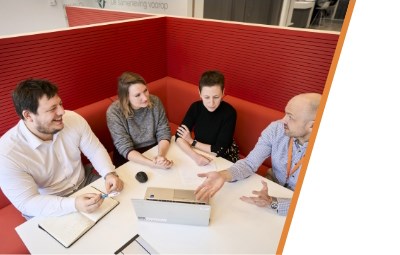Interview with Stephanie and Sven from CDO Office

She works in Brussels, he works in Berlin, yet they manage to work together seamlessly as one team. Stephanie Slachmuylders is CDO Office Manager, while Sven Schaust is an employee of that same Office and serves as Stephanie’s replacement while she is on maternity leave.
Most of us know our Chief Digital Officer, but what exactly is CDO Office?
Stephanie Slachmuylders: ‘We support Michael von Roeder, the Chief Digital Officer, the big boss of IT. The Digital division is split into several sub-departments: Application Development & Maintenance (ADM), Infrastructure, Datacom & Security (IDS), Digital & Data, and Innovation. But there’s also our team, which acts as a kind of interface between all the others. We deal with all cross-cutting topics, anything that does not strictly fall within the remit of one of the sub-departments.’
How long has the Office been up and running?
Sven Schaust: ‘Almost four years. It was established in 2020 as part of the partnership between Elia and 50Hertz. The Office is a kind of neutral party. All our projects are in the interest of the Group as a whole, not of one department, or of Elia or 50Hertz alone. We see the big picture and pinpoint where we can best offer support.’
How big is the team?
Stephanie: ‘Our core team currently consists of eight employees: three from Belgium and five from Germany. But depending on the topic, we call on the necessary experts to join our team on a temporary basis.’
What topics do you cover?
Stephanie: ‘We mainly focus on four areas: IT Budget & Controlling, Strategy & Roadmaps, IT Service Management, and Information Security. Our main goal each time is to make processes more efficient and to harmonise them. Take strategy, for instance. It’s vital that we have one strategy for IT, not one for Elia and another for 50Hertz. We also try to harmonise information security as much as possible. Legislation differs in Belgium and Germany, so we can’t harmonise everything, but we do share best practices, templates, documents, and so on.’
Sven: ‘The same goes for IT Budget & Controlling. There used to be separate budgets for Elia and 50Hertz but now that we’re one group, a good overview is key: how much do we spend on IT in total? We need to manage the budgets in the same way in order to spotlight exactly where the money is going.’
Is there a big cultural difference between the Belgian and German way of working?
Sven: ‘Germans like rules. We like to write everything down properly, to keep records and documents of everything. Belgians tend to be a bit more pragmatic. They think ‘we know how it works, we don’t need to write everything down to the last detail’. They have a bit more freedom in terms of approach.’
How do you bridge that gap?
Sven: ‘By communicating well, by helping others understand why you want to do certain things and what you want to achieve, and then working together to figure out how to reach common goals as efficiently as possible.’
Does the cooperation between Germany and Belgium also benefit you?
Stephanie: ‘Absolutely, we keep each other nicely balanced. For example, we can learn from our German colleagues that it’s definitely a good idea to work in a more structured way and make sure everything is well documented. When someone is sick or unexpectedly absent, their replacement then has a better grasp of what exactly they need to do.’
Sven: ‘Conversely, it can be helpful for German teams to empower employees more like in Belgium, to give them greater freedom and let them make their own decisions about how they do their work. So German colleagues could be more pragmatic in their work at times, while our Belgian colleagues could adopt a more structured approach. It all comes down to striking a good balance.’
Do you learn from each other in terms of content?
Stephanie: ‘Definitely. Take the e-learning module on information security. 50Hertz was ahead of us when it came to digital training, as it already offered a course with tips on passwords, how to handle documents containing sensitive information, and so on. We translated and adapted part of it, saving us a lot of money and time when rolling out similar training in Belgium.’
In practical terms, how do you cooperate with half the team being in Brussels and half in Berlin?
Stephanie: ‘Every Tuesday we have an online team meeting where we discuss topics and give each other advice. On Friday afternoons we also hold a virtual coffee break, where we chat about more personal things. We also organise regular live meetings in Berlin and in Brussels, or somewhere between the two capitals like Cologne or Frankfurt, for example.’
Sven: ‘Those live meetings are really important. Teams meetings are handy too. We organise them in telepresence rooms, which offer an experience similar to a face-to-face meeting. Still, it’s good to see each other in the flesh from time to time. That strengthens relationships, something that’s vital in this job.’
Based on your own work experience, do you have any further advice for your colleagues?
Sven: ‘Good communication is crucial. That applies to all companies, but especially to a company like Elia Group that has teams in Berlin and Brussels. As soon as you’re sure you’ve understood something correctly, talk to colleagues or stakeholders. Try to empathise with their point of view before defending your own.’
Stephanie: ‘It’s also in everyone’s interest to properly check out what’s happening within other teams, divisions or departments before launching a new initiative or project. Often you can collaborate or build on past achievements, helping us boost our efficiency as a company.
I’d also like to say that colleagues with questions can come to us. If they identify a topic that impacts multiple IT departments, they can always contact us and together we’ll see if we can help or possibly roll out a project.’